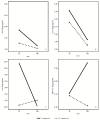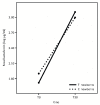Administration of a Multi-Strain Probiotic Product to Women in the Perinatal Period Differentially Affects the Breast Milk Cytokine Profile and May Have Beneficial Effects on Neonatal Gastrointestinal Functional Symptoms. A Randomized Clinical Trial
- PMID: 27801789
- PMCID: PMC5133065
- DOI: 10.3390/nu8110677
Administration of a Multi-Strain Probiotic Product to Women in the Perinatal Period Differentially Affects the Breast Milk Cytokine Profile and May Have Beneficial Effects on Neonatal Gastrointestinal Functional Symptoms. A Randomized Clinical Trial
Abstract
Background: Probiotic supplementation to women during pregnancy and lactation can modulate breast milk composition, with immune benefits being transferred to their infants.
Aim: The aim of the study was to evaluate the effect of high-dose probiotic supplementation to women during late pregnancy and lactation on cytokine profile and secretory IgA (sIgA) in breast milk and thus to study if differences in breast milk composition can affect lactoferrin and sIgA levels in stool samples of newborns. The safety of maternal probiotic administration on neonatal growth pattern and gastrointestinal symptoms were also evaluated.
Methods: In a double-blind, placebo-controlled, randomized trial, 66 women took either the probiotic (n = 33) or a placebo (n = 33) daily. Levels of interleukins (IL-6, IL-10 and IL-1β), transforming growth factor-β1 (TGF-β1), and sIgA in breast milk; and the level of sIgA and lactoferrin in newborn stool samples were analyzed at birth and then again at one month of life. Antropometrical evaluation and analysis of gastrointestinal events in newborns was also performed.
Results: Probiotic maternal consumption had a significant impact on IL6 mean values in colostrum and on IL10 and TGF-β1 mean values in mature breast milk. Fecal sIgA mean values were higher in newborns whose mothers took the probiotic product than in the control group. Probiotic maternal supplementation seems to decrease incidence of infantile colic and regurgitation in infants.
Conclusion: High-dose multi-strain probiotic administration to women during pregnancy influences breast milk cytokines pattern and sIgA production in newborns, and seems to improve gastrointestinal functional symptoms in infants.
Keywords: functional GI diseases; immunology; pediatric gastroenterology; probiotics/prebiotics.
Conflict of interest statement
The authors declare no conflicts of interest.
Figures






References
-
- Crosby M.S., Blattner C.M., Goedken M., Murase J.E. Update: Do probiotics prevent or treat pediatric atopic dermatitis? Pediatr. Allergy Immunol. 2016;27:425–428. - PubMed
-
- Vitali B., Cruciani F., Baldassarre M.E., Capursi T., Spisni E., Valerii M.C., Candela M., Turroni S., Brigidi P. Dietary supplementation with probiotics during late pregnancy: Outcome on vaginal microbiota and cytokine secretion. BMC Microbiol. 2012;12:236. doi: 10.1186/1471-2180-12-236. - DOI - PMC - PubMed
-
- Mastromarino P., Capobianco D., Miccheli A., Praticò G., Campagna G., Laforgia N., Capursi T., Baldassarre M.E. Administration of a multistrain probiotic product (VSL#3) to women in the perinatal period differentially affects breast milk beneficial microbiota in relation to mode of delivery. Pharmacol. Res. 2015;95–96:63–70. - PubMed
Publication types
MeSH terms
Substances
LinkOut - more resources
Full Text Sources
Other Literature Sources
Medical
Miscellaneous

